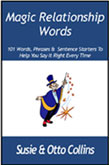A Review of Susie and Otto Collins' E-Book "Magic Relationship Words"
Reviewed by Dr. Nathan Cobb, Ph.D. in MFT, RMFT, R.Psych
You may have come across the sales page online recently for Susie and Otto Collins' book, "Magic Relationship Words" and wondered whether this book could help you strengthen your relationship. As a professional marriage counsellor and psychologist, having also discovered this book online, I purchased it from the Magic Relationship Words website so that I could review it and see if it was something I could recommend.
Along with the Magic Relationship Words book (which is 146 pages), there were a number of additional reports and audio recordings that came as part of the download package. These included:
- The Top Ten Communication Mistakes that People Make in Relationships and What to Do About Them. - a 24-page report
- 21 Words, Phrases and Sentence-Starters that You Should Never Say to Your Partner, Spouse or Lover - an 18-page report
- A supplementary audio teleseminar on Magic Relationship Words, Part 1 and Part 2 - about an hour and a half recording in total.
I enjoyed this book and would recommend it to couples who are seeking ways to feel closer, defuse conflict, and understand each other more fully, as it offers practical and straightforward suggestions for improving couple communication. It describes 101 helpful phrases or sentence starters that can help deepen connection and defuse tension.
For each phrase or sentence, the authors discuss in detail why such words are particularly effective at defusing conflict and helping spouses work through misunderstandings and grow closer together. The authors also offer specific examples of how each phrase can be used to enhance communication.
Here is an example of one of the phrases that the authors discuss. "I feel ______ when I ______." This is a type of I-statement. For example, you might say, "I feel scared and anxious when I see you looking at other women," or "I felt like I didn't matter when I learned that you had already made the decision."
Describing your feelings in this manner helps you to own the feelings you are experiencing, and to express what is going on for you while moving away from building a case against your partner or making your spouse wrong. By defining ourselves in this way and being more vulnerable with our spouse by expressing our own feelings instead of making our spouse wrong, we can elicit more compassion and understanding and less contention than if we were to go into attack mode by blaming and accusing the other person.
After talking about why phrases and words such as these are helpful, the authors then go on to provide detailed examples or case studies showing how such phrases and words are used in practice.
Another phrase discussed in the book is, "It may not have been your intention ________." The purpose of this phrase is to give your spouse the benefit of the doubt that he or she may not have meant to hurt you, even though something they did actually caused hurt. It acknowledges your belief in their goodwill even if there was a misunderstanding.
Your spouse may be less likely to react defensively if you say, "It may not have been your intention to be hurtful when you joked about my embarrassing moment in front of our friends but the way you said it really did hurt my feelings," versus when you say, "Why do you have to be such a jerk and make fun of me in front of my friends?"
The book describes 99 more of these types of phrases, including:
- I'm going to love you anyway ...
- I want our relationship to grow and I want us to be close again _______
- Is this what you meant when you said _______
- You are right. I can see how you might feel that way.
- Why is this important to you?
- Here's how I'm intending this to be _________.
- What I'm feeling is _________ and what I'd like to feel is _________.
- And many others ...
There has been a great deal of research in the past number of years that have shown us that real change in relationships comes when spouses and partners soften their hearts, and become more accessible, vulnerable and emotionally responsive to each other. Such words and phrases as talked about in this book can help invite and promote this type of softening, if used with real intent and openness to change.
In other words, while the phrases and words themselves are positive and helpful, the real "magic" of these words lies in the open-heartedness, accessibility and willingness of the communicators to be there for each other, as they communicate in more vulnerable and genuine ways, using words and phrases such as these.
Sometimes it can be hard to know what to say. You may be in a position where you really want to start a better way of communicating or to say something that will help draw you closer, and yet not know how to start. That's where a book like this can help.
By the same token, the authors acknowledge that even the kind of words they outline in this book can be used as weapons if one's heart is not fully open or if one has a judgmental attitude that shows up in their tone of voice or body language. In my experience I am inclined to agree. The key is that you approach your spouse with an open and responsive heart and then honest and genuine words such as these can work their magic in helping you to connect more with your partner.
For someone who has an appetite for learning as much as possible on building a better marriage, this book would be a really useful addition to anyone's library.
Click here to go to the Magic Relationship Words website
Affiliate Disclaimer: Some of the links to resources listed on this site are affiliate links, including the resource listed on this page. This means that if you click on a link pointing to a vendor on this page and you subsequently purchase any product from that vendor, Cobb & Associates Inc. will receive a percentage of that sale. Please know that we will only review and recommend products that we feel are of high quality and value to the reader. If any product we find on the internet is not of high quality it will not be reviewed on this site. Cobb & Associates was not offered this product for free in exchange for a review. Affiliate commissions are one method we use to offset marketing costs and are not a significant source of income for Cobb & Associates.









